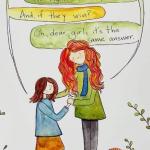Mister Rogers’ Neighborhood was a half-hour children’s program that ran on public television stations from 1968 until 2001. It was hosted by Fred Rogers, a gentle, earnest, kind man who became a regular, daily presence in the homes of millions of Americans.
Everyone who remembers Mister Rogers remembers him fondly. He cared about his viewers. He cared about us. And he taught us things — gentle, simple things that made the world less frightening, more interesting, more beautiful, and more fun. More neighborly.

The show was as earnest and straightforward and simple as its host. Mister Rogers would come in, singing a happy little song. He would change from his suit jacket and dress shoes into a cardigan and sneakers, and then, for half an hour, he would sing a few more happy little songs, introduce us to some of his neighbors, and then play for a bit with some puppets.
If you grew up in America during the last half of the last century, you probably remember all of this. You learned things from that show, and from its host — basic, simple things about yourself and about the world. The kinds of basic, simple things that you learn at such a young age that you may not even remember learning them. The kinds of basic, simple things that it seems like you’ve always known, your whole life, forgetting that you were ever so very young that you didn’t yet know them.
The simplest, most basic lesson Mister Rogers taught us — almost every day, in almost every show — had two parts to it. This was Mister Rogers most important lesson and the most important part of this lesson was the fact that both parts of it were absolutely vital to remember as two inseparable truths to carry with us all day, every day, as we got older.
Here they are:
1. You — yes, you — are special. You are important, and unique, and infinitely valuable. There is nobody else like you, like you, I like you my friend, you’re special.
2. This is also true for every other person you will ever meet and for every other person you will never meet. Every one of them — every one — is special, important, unique, and infinitely valuable.
Some of the problems we face in life occur because we forget the first part of that lesson. Don’t let that happen. Don’t ever forget that true thing — the simplest and most basic and most important of true things. You — yes, you — are special. You are important, and unique, and infinitely valuable.
And don’t ever let anyone else tell you that’s not true. When someone tries to tell you you’re worthless, don’t listen to them. Because you are my friend and you’re special, special. You are my friend and you’re special to me.
Mister Rogers was an ordained minister. commissioned as a missionary. So when he sang “You are my friend and you’re special to me” what he also believed was that “You are God’s friend and you’re special to God.” I also believe that. But Mister Rogers was a wise man who understood that showing is more convincing than telling, so he was confident enough in the truth of that belief not to need to express it most of the time as something abstracted or separated from his own expression of love and esteem and friendship.
But forgetting that first part of the lesson is not where most of our problems come from. Most of our problems — most of your problems, and mine, and all of ours — come from people who remember that first part of Mister Rogers’ lesson and wholeheartedly accept that part, but who forget the second part of the lesson.
Most of our problems — most of the problems with the world as a whole — come from people who understand and accept that they are important, and unique, and infinitely valuable, but then forget that the same exact thing is just as true of every other person they will ever meet.
Remembering both parts of this simplest and most basic of lessons is the only way to live a happy, meaningful life. What do we mean by happy? What do we mean by meaningful? Well, here again, it’s better to show than to tell. You’ll know it when you see it.
Remembering both parts of this simplest and most basic of lessons also has implications in other areas, of course — things we’ll learn about later when we get bigger and more grown up. Just because things like “foreign policy” and “criminal justice” and “economics” and “housing policy” are complicated and grown-up matters doesn’t mean they can be conducted truthfully if they’re not based on both parts of this simple, basic, most-important-of-all lesson.
So don’t forget that. As a person. Or as a country.
Because, if you do — when you do — you may find that one other thing Mister Rogers taught us when we were little isn’t always necessarily true. If we forget the second part of the most important lesson, we will go down the drain.













